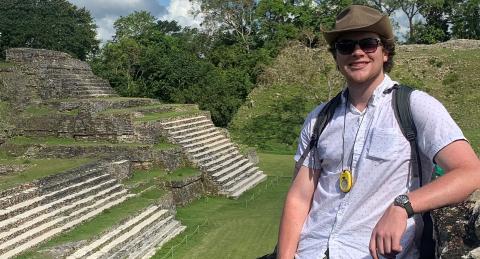
Why did you choose UNH?
Initially I wanted to go to school up North, and when I was researching schools my father suggested I add UNH to the list. He worked here in the Marine Lab in the mid-to-late 90s and, after taking a single tour in 2019, I knew that UNH was the school for me.
How did you choose your major and why?
I have always been fascinated by ancient cultures and their influence on our modern lives. I have also always felt connected to the clues they have left behind in their literature, architecture and the material remains we now call artifacts. I always wanted to become an archaeologist and had a vague understanding of where I could go in that direction; however, after taking Ancient Greek Civilization with Dr. McMahon, as well as some anthropology classes, I realized I could combine both of these interests in my studies.
What do enjoy about your major, your major department and/or your major department faculty?
I feel as though I am supported at every turn of my academic career in both of these departments. All of my professors have been extremely kind and have supported me in every facet of my pursuit of additional opportunities and options for expanding my knowledge and appreciation for the subjects I am studying. I feel comfortable meeting with and discussing different ideas with my professors, and am driven to seek out extra opportunities to learn more in many different environments.
What do you enjoy about being in the College of Liberal Arts?
COLA has provided me with a network of connections and opportunities to expand my academic profile and has overall provided me with some of the most interesting and engaging experiences of my life. The students are also welcoming, and I have made some incredible friendships in this college.
Describe any experiential learning you've undertaken?
I have had a few very monumental experiential learning opportunities provided to me through COLA at UNH. This past summer I studied abroad on two archaeological field schools, one in Northern Greece near Macedon, where I worked on the excavation of the ancient Greek city of Argilos which was occupied during the Classical and Hellenistic periods. After this project, I joined Dr. McMahon on his research project at Çadır Höyük, a settlement in Turkey which has had close to 6,000 years of continuous human occupation, from the Middle Chalcolithic Period until the Byzantine period when it collapsed. On both of these projects I learned the ropes of an archaeological excavation, how to dig and identify artifacts, how to read stratigraphy (the layers of the soil that change due to conditions such as occupation or a destruction event), and most importantly, how to think like an archaeologist. I have also worked in the lab as an intern at Strawbery Banke with Dr. Alexandra Martin, learning how to properly wash, catalogue and identify artifacts from archaeological excavations. Most recently, I was invited by Dr. Harrison-Buck to volunteer as student staff on her archaeological research project in Belize. The Belize River East Archaeology (BREA) project study area encompasses the lower half of the Belize River Watershed between Belmopan and Belize City, a roughly 6000 sq. km area. During the three week season there, I assisted teaching the students how to excavate in the field and how to use their tools to uncover structures, and assisted the staff in day-to-day tasks. This coming summer I am also going to be joining Dr. Van der Graaff on his excavation in Italy, on which we will be excavating an ancient Roman villa that was buried during the eruption of Mt. Vesuvius, which also buried the famous cities of Pompeii and Herculaneum.
Have you received scholarships or funding from COLA or UNH that has made a big difference for you and enabled you to do something you would not have been able to do otherwise?
Yes, the scholarships I have received have allowed me to participate in all of the fieldwork I have done through my undergraduate career here at UNH. Without it, I would not have been able to participate in many, if not all, of these programs.
Are you involved in any groups, clubs or organizations?
Lambda Chi Alpha fraternity
How is COLA preparing you for career and professional success?
I am gaining the professional and academic skills to succeed no matter what direction I go in. Should I continue to pursue academia, I am well versed in my field with knowledge and experience already, and hopefully this will assist me in applications to Graduate programs and other future endeavors.
What are your post-graduation plans at this point?
I am planning to study maritime archaeology through a graduate program for my master's degree, for which I will be applying for a Fulbright. I hope to receive my Ph.D. after my master's and I would like to become a professor as my career.
What is the one thing people might be surprised to learn about you?
I am certified as a scientific scuba diver. I received this certification through a course at UNH and am hopefully going to attend an underwater archaeological field school this summer as well should all go well :).